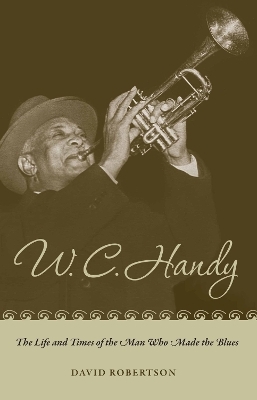
W. C. Handy
The Life and Times of the Man Who Made the Blues
Seiten
2011
The University of Alabama Press (Verlag)
978-0-8173-5696-5 (ISBN)
The University of Alabama Press (Verlag)
978-0-8173-5696-5 (ISBN)
David Robertson charts W.C. Handy's rise from a rural Alabama childhood in the last decades of the nineteeth century to his emergence as one of the most celebrated songwriters of the twentieth century.
David Robertson charts W. C. Handy's rise from a rural-Alabama childhood in the last decades of the nineteenth century to his emergence as one of the most celebrated songwriters of the twentieth century. The child of former slaves, Handy was first inspired by spirituals and folk songs, and his passion for music pushed him to leave home as a teenager, despite opposition from his preacher father. Handy soon found his way to St. Louis, where he spent a winter sleeping on cobblestone docks before lucking into a job with an Indiana brass band. It was in a minstrel show, playing to racially mixed audiences across the country, that he got his first real exposure as a professional musician, but it was in Memphis, where he settled in 1905, that he hit his full stride as a composer. At once a testament to the power of song and a chronicle of race and black music in America, W. C. Handy's life story is in many ways the story of the birth of our country's indigenous culture - and a riveting must read for anyone interested in the history of American music.
David Robertson charts W. C. Handy's rise from a rural-Alabama childhood in the last decades of the nineteenth century to his emergence as one of the most celebrated songwriters of the twentieth century. The child of former slaves, Handy was first inspired by spirituals and folk songs, and his passion for music pushed him to leave home as a teenager, despite opposition from his preacher father. Handy soon found his way to St. Louis, where he spent a winter sleeping on cobblestone docks before lucking into a job with an Indiana brass band. It was in a minstrel show, playing to racially mixed audiences across the country, that he got his first real exposure as a professional musician, but it was in Memphis, where he settled in 1905, that he hit his full stride as a composer. At once a testament to the power of song and a chronicle of race and black music in America, W. C. Handy's life story is in many ways the story of the birth of our country's indigenous culture - and a riveting must read for anyone interested in the history of American music.
David Robertson is the author of three previous biographies - of the slave rebel Denmark Vesey, the former U.S. secretary of state James F. Byrnes, and the bishop James A. Pike - and of a historical novel about John Wilkes Booth. His poetry has appeared in the Sewanee Review and other journals, and he has provided political and literary commentary to ABC News and the Washington Post. He was educated in Alabama and lives in Ohio.
| Erscheint lt. Verlag | 30.10.2011 |
|---|---|
| Verlagsort | Alabama |
| Sprache | englisch |
| Gewicht | 488 g |
| Themenwelt | Literatur ► Biografien / Erfahrungsberichte |
| Kunst / Musik / Theater ► Film / TV | |
| Kunst / Musik / Theater ► Musik ► Jazz / Blues | |
| Sozialwissenschaften ► Soziologie | |
| ISBN-10 | 0-8173-5696-7 / 0817356967 |
| ISBN-13 | 978-0-8173-5696-5 / 9780817356965 |
| Zustand | Neuware |
| Haben Sie eine Frage zum Produkt? |
Mehr entdecken
aus dem Bereich
aus dem Bereich
zur politischen Ästhetik des Jazz
Buch | Hardcover (2023)
Phillip Reclam (Verlag)
38,00 €
Die Geschichte des Jazz in Deutschland
Buch | Softcover (2021)
Reclam, Philipp (Verlag)
20,00 €


